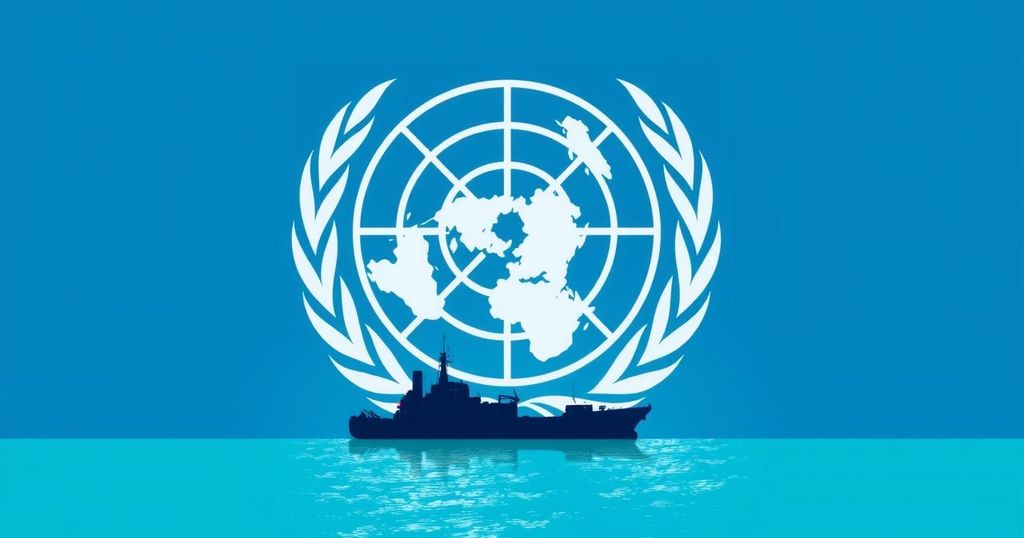Celebrity
AFRICA, AGK FIRE INC, ASIA, CHINA, DIPLOMACY, EU, EUROPE/ASIA, GO, GOPI, IANS, INTERNATIONAL RELATIONS, LIBYA, LIBYA SANCTIONS COMMITTEE, MARITIME SECURITY, MEXICO, MOVIES, MU, MUAMMAR GADDAFI, NORTH AMERICA, RUSSIA, SANCTIONS, SECURITY, SECURITY COUNCIL, SOCIAL, SOCIALNEWS, UN, UNITED NATIONS, UNSC, XINHUA
Oliver Grayson
0 Comments
UN Extends Authorisation to Inspect Vessels Suspected of Violating Libya Arms Embargo
The UN Security Council has extended the authorization for member states to inspect vessels suspected of violating a Libya arms embargo. Resolution 2780 allows inspections for six more months and requires a report on implementation within five months. Russia and China abstained from the vote, citing questions about the effectiveness of the EU’s inspection operation. The arms embargo has been in place since 2011, following Gaddafi’s ousting.
The United Nations has taken a significant step in maintaining its arms embargo on Libya. On May 30, the UN Security Council officially adopted Resolution 2780, which extends the authorization for member states to inspect vessels suspected of violating this embargo. This resolution will remain in effect for an additional six months, allowing countries to scrutinize ships on the high seas that are traveling to or from Libya. This applies if there are reasonable grounds to believe these vessels are carrying arms or related materials in breach of the embargo.
The resolution requires the UN Secretary-General to provide a report to the Security Council within five months on how well the resolution is being implemented. Notably, the resolution was passed with a vote of 13 in favor, while Russia and China chose to abstain. These two nations expressed concerns over the effectiveness of the EU-led operation, IRINI, which is currently the only regional effort authorized to inspect vessels under this resolution. They also questioned the methods used for disposing of the items that were intercepted.
The backdrop to this resolution is a significant one; in 2011, the UN imposed sanctions, including the arms embargo on Libya, following the political upheaval that led to the downfall of former leader Muammar Gaddafi. The Libya Sanctions Committee of the UNSC has the authority to designate vessels under the sanctions regime, which includes prohibiting transactions related to crude oil that is illegally exported from Libya.
Resolution 2292 was previously adopted in June 2016, enabling the inspections of vessels on the high seas to support the enforcement of the arms embargo. As the situation evolves in Libya, the international community remains watchful, aiming to uphold the regulations surrounding arms transport and to continue monitoring any illicit activities tied to the embattled nation.
The UN insists that robust action is essential to ensure compliance with the arms embargo, as this measure ultimately aims to foster peace and stability in Libya. The discussions in the Security Council highlight ongoing concerns about regional security and the challenges that come with enforcing international regulations in conflict zones.
As of now, the United Nations is poised to continue its role in facilitating dialogue and oversight, while member states are expected to step up their vigilance against arms trafficking to Libya. The situation remains fluid, and with the newly extended resolution in place, there is a clear intention to tighten control over arms supplies to the troubled region.
In conclusion, the UN Security Council’s adoption of Resolution 2780 represents a crucial step in extending the oversight of the arms embargo against Libya. With the resolution’s six-month timeframe and mandates for reporting, the emphasis remains on enhancing compliance and limiting illicit arms trafficking. The abstention of Russia and China suggests ongoing concerns about the efficacy of current operations, an area warranting further scrutiny as the international emphasis on Libya’s stability continues.
Original Source: www.socialnews.xyz




Post Comment